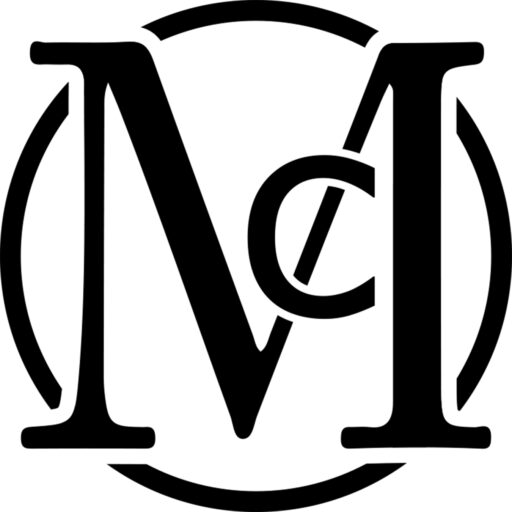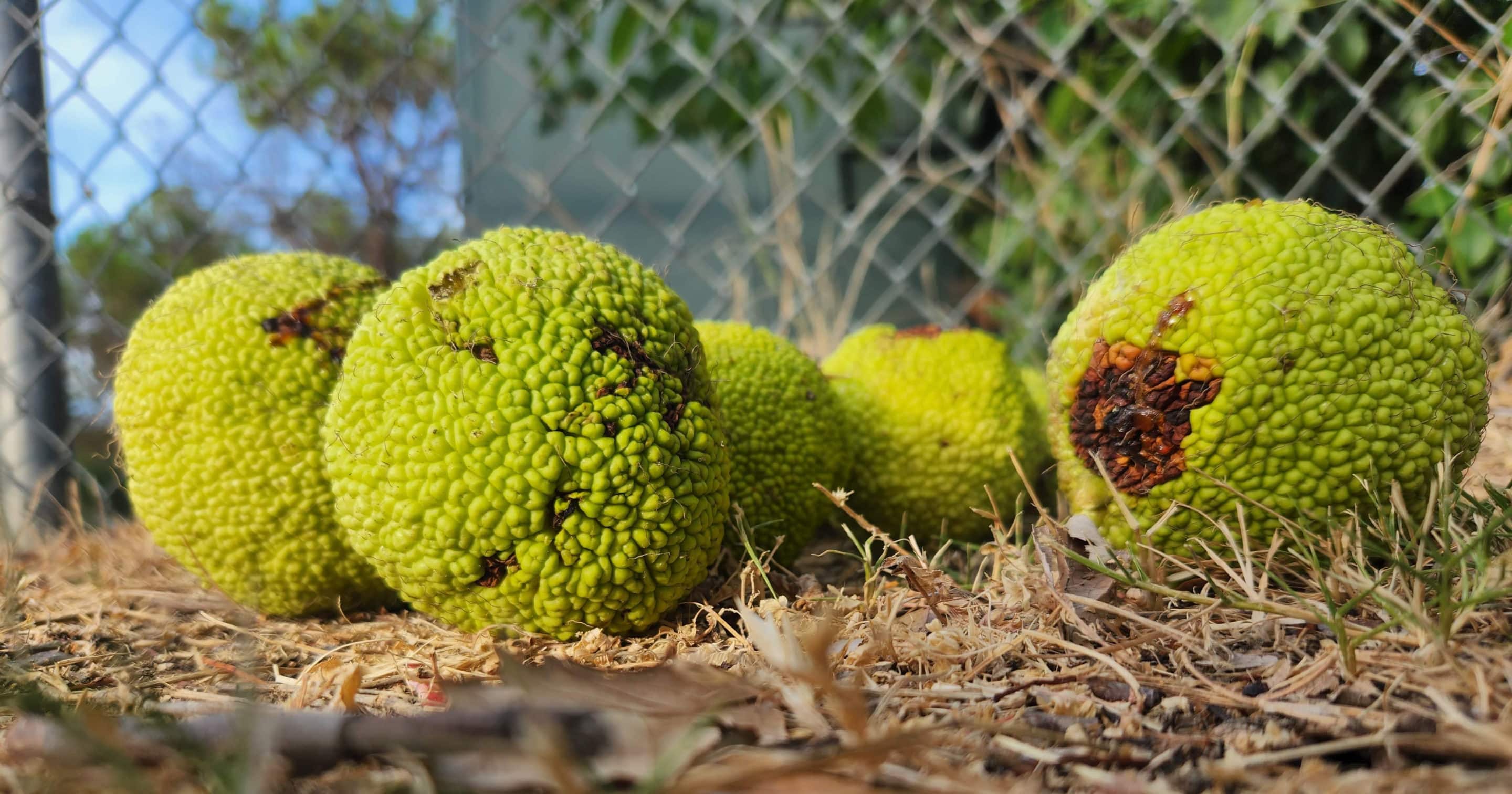My younger brother, Preston, and I spent our wonder years in Nashville’s northern suburbs. Madison was a typical mid-sized, Southern town with a heavy blue-collar influence. It was a great place to grow up.
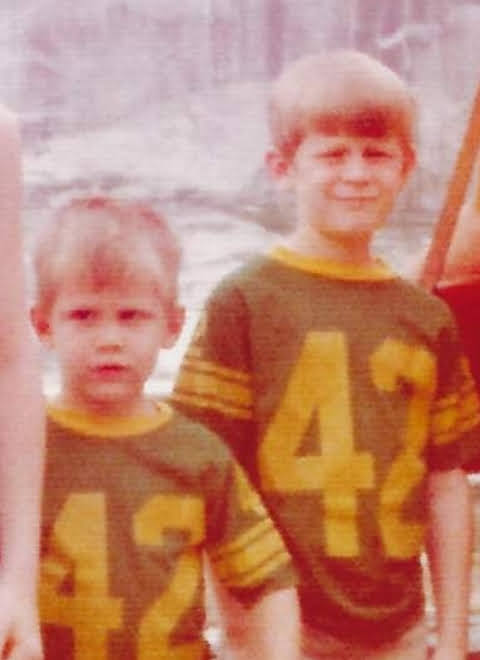
Summers were different in those days. Vacations from school had fewer organized events than they do today. We spent most of our day unsupervised, playing outside in the yard until 3:30 when it got really hot and we retreated inside to watch black-and-white reruns of the Six Million Dollar Man and Gilligan’s Island until dinner, which came early at our house.
Like most of the homes on our street, our lot was a rambling acre and a half. Since none of the neighbors had fences, the space seemed even bigger, especially in the eyes of a child. Our empire was divided into three territories. The first was the front yard, which was the most visible from the street, but was too hilly for most things and generally sat empty.
The second was the area beside and immediately behind the house where we spent most of our time. It offered the best, flat spots to play in our hilly yard.The garage was nearby and offered relief when the sun was too hot.
The third area included everything from the creek to the edge of the Great Woods (or so they seemed in the day). We didn’t play back there much. It was basically a pasture area with tall grass and uneven footing. Most of the time, it sat quietly empty.
That secluded territory was ruled by the Hedge Apple Tree. It was the reason for the tall grass as well as the absence of inflatable balls, bare feet, or traditional entertainment. The Tree determined how things were done in its quiet corner of the kingdom.
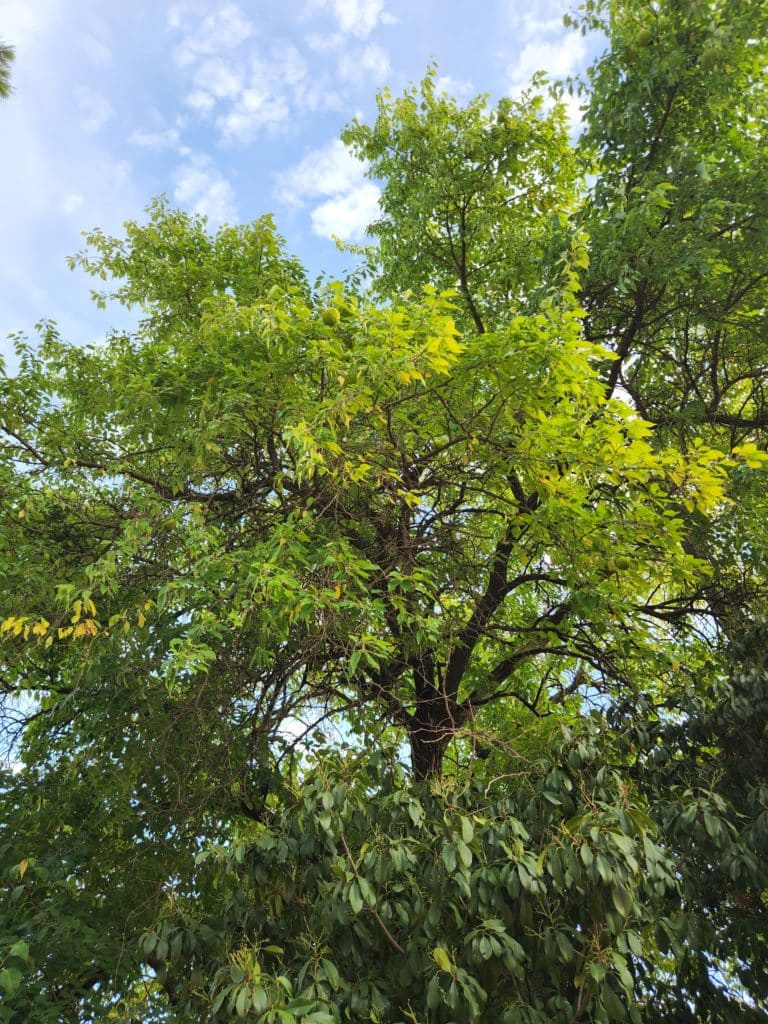
Depending on where you grow up, the tree has different names – Hedge Apple, Bodark, Osage Orange, or Horse Apple. They all refer to the same tree which is most recognized for the weird, green fruit it produces. Most of us have seen the “apples” laying on the ground somewhere. As small as a golf ball or larger than a softball, they have a bumpy texture that resembles a human brain with a milk-colored, sticky pitch inside that is hard to wash off your hands.
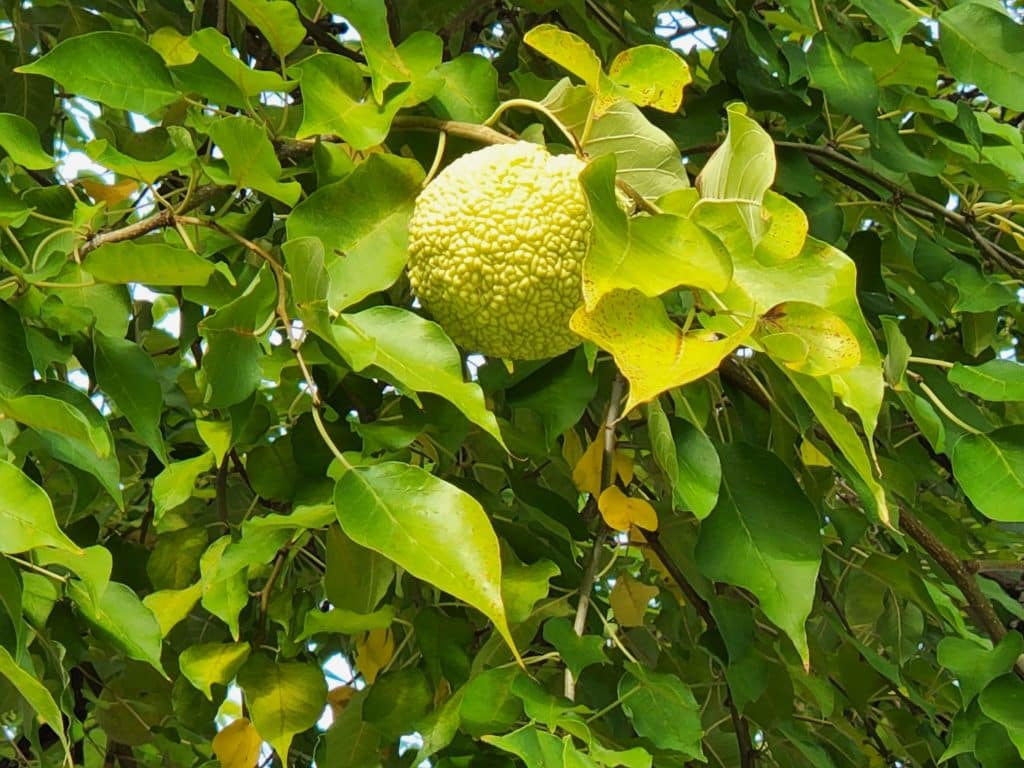
The part of the yard we referred to as “across the creek” was frequently used as a bowling alley. From a young age, Preston and I would attempt to roll the sticky green “apples” from their resting place under the Tree into the creek about a hundred feet away. As small children, it seemed an impossible achievement, but we dreamt of a day when we would be strong enough to bounce one clear across the creek.
Every summer we could roll them a little further than the previous year, and we measured our progress much like a parent would mark a kid’s height on a door jamb.
The Hedge Apple Tree demanded a special lawnmower for its part of the yard. The inflatable tires on the riding mower were no match for its thorns. Dad firmly told us never to use the big mower back there, but he must have suspected that we did when he found all of its tires were flat.
Occasionally, we would have to trim the Tree’s drooping branches. They hung low to the ground and the sharp thorns would snare anything that brushed by. As we dragged the cut branches back to the rubbish pile, we would wince each time our carelessness allowed a thorn to tear across our hands, arms or legs, reminding us to respect the Tree and its rule over an untamed province.
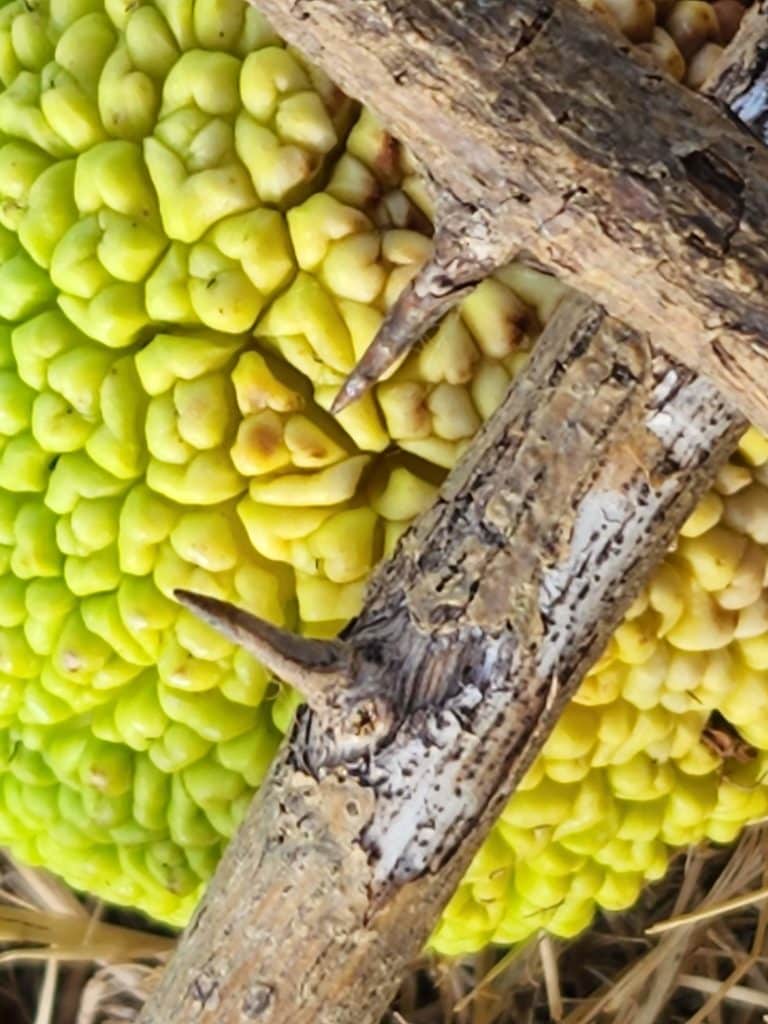
One day, Dad decided that the time had come to cut down the Hedge Apple Tree. I don’t know why. After he dropped it, we drug off the branches leaving the exposed stump. One uneventful day, Preston and I pretended we were lumberjacks, retrieving the small, C-shaped tree saw from the garage and setting to work shortening the stump by a few inches.
The saw was just big enough for each of us to grab one end so we took turns pushing and pulling while sawdust flew out of the crack. However, the famously hard wood quickly tired us and the sawdust stream slowed to a trickle. Before long, our arms gave out completely. After multiple attempts, we gave up and moved on to other amusement. Even in death, the Hedge Apple Tree was defiant. “One day” we thought ” we will be strong enough to cut that stump.”
When the Tree was gone, it seemed like a good riddance. No more thorns, no sticky apples. No reasonable person would plant a hedge apple tree in their yard. As properties gradually converted from pastures into park-like lawns, the lowly hedge apple tree was forced to surrender its place to the new order.
With the fall of each hedge apple tree, the world became a more controlled and cultured place. My lawn’s garden beds may now be colorful and balanced, but part of me longs for the unruly conditions “across the creek”. These may be safer times, but I miss the days of kids running wild for hours exploring the world that God gave us and testing the limits of their imaginations.
The change for Preston and I was inevitable. Every summer we grew a little bit taller and explored further beyond our familial borders. We gradually abandoned the Lost Boys of Neverland in favor of building the lives we had been dreaming about.
For Preston’s birthday this year, I wanted to build something reminiscent of good times we have shared. That is when I remembered the old Hedge Apple Tree. It represents an untroubled time in our lives when the two of us were inseparable. As its reign ended, our lives sometimes moved in different directions. However, we have stayed close through it all. Decades later, we are able to see life through a special lens that only we share.
There will always be a part of us that is still standing together on a lazy, hot summer day “across the creek” bowling apples and laughing at the erratic, bouncing paths they take or cheering when they occasionally exploded into pieces. Then and now, we are content to share seemingly insignificant moments that serve as stepping stones into our future days.
Excited by the chance to build something that heralded back to yesteryear, I decided to build a cutting board from the same type of wood we have remembered so often. It took days to find a lumber mill crazy enough to convert the rock-hard hedge apple logs into dimensioned boards, but I finally found one. After days of work, I’m going to need a new saw blade and more sandpaper, but all of the sweat and persistence paid off.
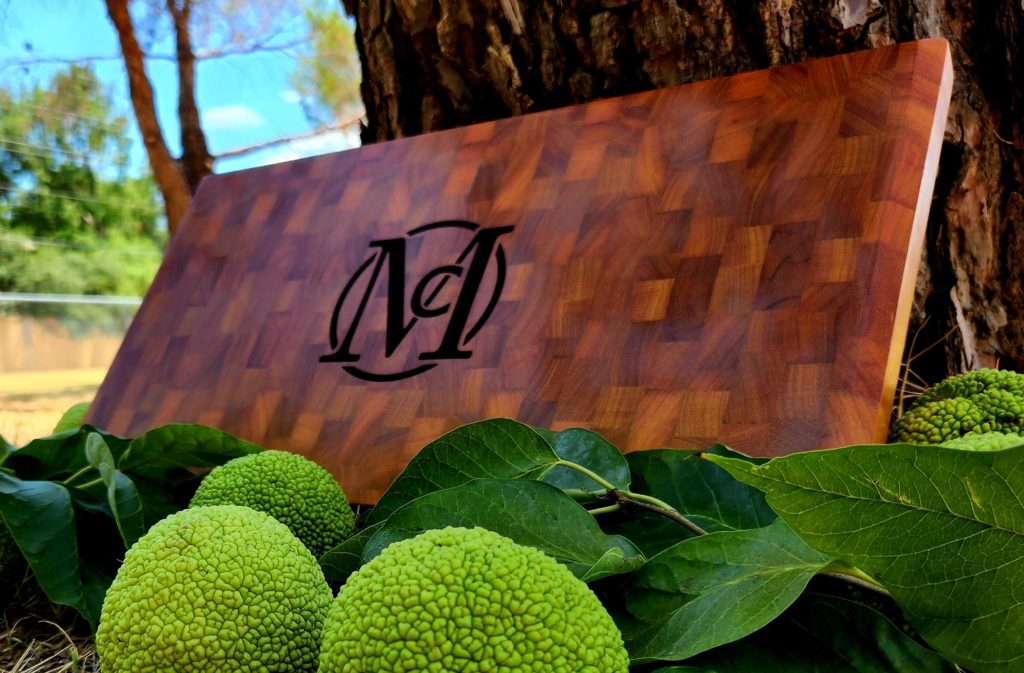
Hopefully it will serve you well, Preston, for years to come. If it ever needs to be sanded down and re-surfaced, then just let me know. You will have to sharpen your own knives though, because I expect it will hold up defiantly through any use that you put it through.
Happy birthday!
